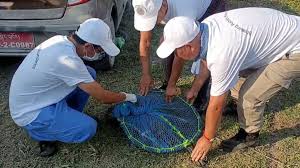In order to promote animal welfare and safeguard public health, an anti-rabies vaccination camp was organized in Dadgari, a village near the Indo-Bhutan border in Assam’s Chirang district. The camp was a collaborative effort between the Bhutan India Friendship Association (BIFA) and the Hatisar Himalayan Club, two organizations committed to community welfare and environmental hygiene. The initiative sought to address the growing concerns surrounding rabies, a deadly disease that can spread through animal bites, particularly from dogs.
The camp, held in the heart of the rural village, attracted local animal owners and residents, who gathered with their pets to ensure they were protected against the deadly virus. This vaccination campaign was a vital step in controlling the spread of rabies, especially in areas like Chirang, where the proximity to forests and remote settlements increases the risk of animal-human interactions. The event was also part of a larger strategy to raise awareness about the importance of regular animal vaccinations, hygiene practices, and the need to control the stray dog population, which often becomes a source of rabies transmission.
Rabies is a viral disease that is transmitted to humans through the saliva of infected animals, often via bites. It is nearly always fatal once symptoms appear, making prevention through vaccination crucial. While the disease remains a significant public health concern, particularly in rural areas, this vaccination drive in Dadgari aims to reduce the number of animal-related rabies cases by ensuring that pets and stray animals are immunized.
The collaboration between the Bhutan India Friendship Association and the Hatisar Himalayan Club showcased the power of community partnerships in addressing local health and welfare issues. Both organizations have been working to improve conditions for animals and the environment in the region, focusing on educating the public about the importance of preventive healthcare for animals.
Organizers of the event were quick to highlight the positive impact of such initiatives on local communities. By vaccinating animals and preventing rabies outbreaks, the camp contributed to the overall well-being of both humans and animals in the area. Local authorities have been encouraging similar efforts across the state, particularly in border regions where health and environmental concerns often go unnoticed.
The success of the anti-rabies vaccination camp is a reminder of the significant role that local communities, supported by non-governmental organizations, can play in improving public health. It also emphasizes the need for a more proactive approach to animal welfare, especially in rural and border areas. While government programs and policies are essential, grassroots initiatives like this one provide immediate, on-the-ground solutions to problems that affect the everyday lives of citizens.
In addition to vaccinating animals, the camp also focused on educating pet owners about responsible animal care. Volunteers and veterinary experts were on hand to provide advice on maintaining pets’ health, handling animal behavior, and preventing the spread of infectious diseases. Such knowledge is vital, especially in rural communities where access to veterinary care and information may be limited.
This event also contributed to the broader goal of improving environmental hygiene. By managing the population of stray dogs and ensuring that pets are regularly vaccinated, the community can reduce the chances of rabies transmission and keep the environment safer for everyone. The success of this vaccination camp highlights the potential for more collaborative efforts between local authorities, NGOs, and communities to create a safer and healthier environment for both humans and animals.
Looking forward, the Bhutan India Friendship Association and the Hatisar Himalayan Club have expressed their commitment to organizing similar events in other regions of Assam. Their ongoing efforts are expected to continue raising awareness about rabies prevention and animal welfare, while fostering a sense of community responsibility toward animal care and environmental protection.

